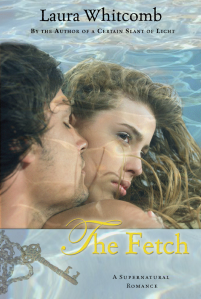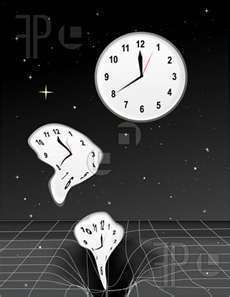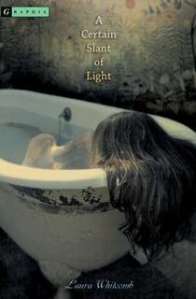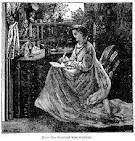Laura Whitcomb's Blog, page 5
April 7, 2012
Beware the Spring
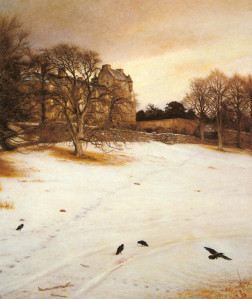
Do not go gentle into the light. Before you celebrate the rising thermometer, think on this: Winter is your friend. Sunshine only tempts you to put on shorts, wash the car, and do the weeding. Some part of you might be longing for fair weather, but the Dark Soul of the winter is the writer's den. Nothing about bad weather is truly a hindrance to the novelist. A laptop warms the knees better than even the plumpest cat. When the chill winds blow and you fold into yourself to hibernate, that's when the storyteller brain wakes up. It's never too cold to write.
Sure, the spring child frolics, innocent, free, picking tight buds that have never seen a bee and starting stories before they've had time to bloom in the brain. She dreams great scenes, only to wake with the sun in her eyes, the idea melted away before her first bite of breakfast.
The summer child lounges in a hammock, tan and barefoot, believing that nothing will ever be as beautiful as the novel she is planning in her head. She thinks that time is infinite. The ambrosia is on tap. She gives away her best lines by leaking them to comrades in spontaneous fits of mutual admiration.
The autumn child, distracted and hesitant, rakes up leaves while the wind is blowing. She keeps re-carding stories then losing the cards. She thinks she should've gotten more done in the summer and dreads the shorter days to come. She feels good about blaming herself and on Halloween night she gets high on fun-sized Snickers only to find that by morning her brilliant idea for a new horror story is nothing more than an illegible scrawl on the back of an orange and black napkin.
But we are winter people.
We gaze into the brooding skies of December and wonder what if the sun never comes back? This tension fuels the gravity of the seasons and calls back the light. Somebody has to watch the moon and keep the stars in check. It's frost on the window that moves the pen to scratch up a spark on the parchment. Something in our ancestral DNA remembers dipping the quill by candle light and keeping a vigil on the longest night of the year.
You know you are a winter child – that stone in your heart that lifts like a feather when you find the right words, it's what makes us kin. We love the other seasons, of course. But we know where we're from. We recognize each other across crowded rooms. You, brothers and sisters, I will find browsing in Powell's on a warm, wet April afternoon or leaving the library with a book tucked under your arm on some brilliant, heady August morning, or laughing with a glass of wine in your hand at some glowing Octoberfest book event . . . but I know you. Passionate, haunted. I see the December in your eyes.
Perhaps we must pass through all the seasons as stages in our formation as writers. When I was young, a spring chick, I would follow the piper of one story, then flit off to follow another in giddy WAD (writer attention deficit) inspiration. I'd write a hundred pages of plans for multiple sequels to a novel of which I had only completed one chapter. I'd carry that manuscript around with me in a battered box tied with a green ribbon. I wanted to be a novelist when I grew up.
As a child of summer I was held back by the idea that my actual writing might not live up to the lush genius I could imagine. In a Coleridge-esque cloud of delirium I'd tuck my work under a bushel. I'd write a manuscript every year but never bother to rewrite. And a year seemed like a very long time.
I suppose now I am in the third quarter of my life. My autumn. I feel bad when a day goes by and I have not written. Not sure how grown up I am, but I am a novelist. I am easily distracted and not just by motherhood. The revision process seems, in an odd way, more important than the creation process. Time flies and gets away from me. A year is like nothing.
But my winter is approaching. That may sound sad, but it's not – my future is brimming with hope and possibility. I will learn to write after my son goes to bed. Bring on the longer nights, I say! No time will be wasted — no day without new pages. When I think of all the novels I still have to write, I will be not afraid. I have miles to go before I sleep but they are Dickensian, Narnian, Christmasy miles. Bless us, every one, and God save the winter.








April 2, 2012
April Give-Away!
The winner of the March Give-Away was Andrea of North Kansas City, Mo. And the April Give-Away will be a surprise grab bag of five (previously read) books that I love. So if you read a lot and like surprises, send your name and physical address to me via the "Email Laura Whitcomb" link on my website.
 And now, in a shameless act, I post a picture of my two-year-old son in Adventureland, Disneyland. =)
And now, in a shameless act, I post a picture of my two-year-old son in Adventureland, Disneyland. =)








March 24, 2012
It’s Kay Snow time again!
There’s still time to fix up some poetry, a short story, an essay, screenplay, or the opening of your current novel and enter The Kay Snow Writing competition. This annual contest awards one first prize of $300, one second place prize of $150, and a third place prize of $50 per winning entry in each of the five categories; fiction, nonfiction, juvenile, poetry, and screenwriting. Also, student writers are awarded $50 for first place in three grade divisions, $20 for second place, and $10 for third place. The deadline is April 23. Before I broke in as a novelist, I won second place in poetry (in the 90s) and first place in writing for a YA audience (about a decade ago) and it was not only good for my self-esteem, it was something to put in my query letter that helped get my agent’s attention. And the entry fees are reasonable. So go check out the Kay Snows at: www.willamettewriters.com








It's Kay Snow time again!
There's still time to fix up some poetry, a short story, an essay, screenplay, or the opening of your current novel and enter The Kay Snow Writing competition. This annual contest awards one first prize of $300, one second place prize of $150, and a third place prize of $50 per winning entry in each of the five categories; fiction, nonfiction, juvenile, poetry, and screenwriting. Also, student writers are awarded $50 for first place in three grade divisions, $20 for second place, and $10 for third place. The deadline is April 23. Before I broke in as a novelist, I won second place in poetry (in the 90s) and first place in writing for a YA audience (about a decade ago) and it was not only good for my self-esteem, it was something to put in my query letter that helped get my agent's attention. And the entry fees are reasonable. So go check out the Kay Snows at: www.willamettewriters.com








March 9, 2012
Advice to the Stumped Fan
(From the Willamette Writers newsletter of March 2011.)
Recently a fan wrote to me asking for help – she felt blocked from writing by the idea that there were too many writers out there already, that she'd never be as good as her favorite authors, and that there was nothing new to write about since it had all been done before.
I wrote back to her with the best advice I could think of, but I admitted that I didn't really struggle with these particular demons. Maybe it would have made more sense, when I was young, to second-guess myself, but that didn't come naturally to me.
I started writing my first short stories when I was ten when the line between fantasy and reality was still fuzzy. I started my first attempt at a novel when I was in tenth grade during those years when one tends to feel invincible. I had constant encouragement from family, friends, and teachers. Failure wasn't a concept I was very interested in.
I was more into my crush on stories. I loved the fiction that I loved – sounds silly but what I mean is that I really loved that which I chose to love: the novels, short stories, movies, plays, and TV shows that charmed or thrilled me were held tenderly in my heart like dear friends. I loved to look at the posters of my favorite movies, sing along to the theme music of my favorite shows, even sniff the indescribable scent of my favorite books. (What is that? Ink? Pressed pulp? Binding glue? I still find that subtle perfume comforting.)
I wanted to create my own characters, plots, and settings, just the kind of stories I would adore reading myself. Perhaps I was overly optimistic, but I did not begin my writing career by comparing myself or my writing to someone or something else. Maybe it was all that positive reinforcement I got as a child, or maybe I was gifted with "happy" chemistry, but I didn't spend much time judging myself. (Not to say that I haven't had my moments over the years. I remember finishing a Barbara Kingsolver novel once and thinking I'd never write that beautifully. And I have certainly read lines that I wish I had written myself. I just don't dwell on those thoughts.)
My best advice for the intimidated writer is this:
There's room for you on the Lit Train. If you weren't born with optimistic tendencies, or if you grew up with a lack of self-esteem building reinforcement, bless your heart for knowing you were a writer. You are right – they were wrong – you are worthy. And just believe me when I say that there is no maximum capacity in the literary world. New writers break in every day.
It takes all kinds. There are all types of books out there. They don't all have to be poetic masterpieces. I don't know about you, but sometimes I want to read something devastatingly gorgeous and other times I just want to read something fun or funny or scary or light. We'll always need new stories to feed our reading hunger. And think about it this way, perhaps every story idea has been done (I don't believe this, by the way) but every writer expresses an idea differently. Thank goodness the basic plot of, let's say, a boy meets girl story was not written only by William Shakespeare but also by Jane Austen and Nicholas Sparks and Madeline L'Engle. Thank goodness the pain of war was approached by Victor Hugo as well as by Margaret Mitchell and Kurt Vonnegut, etcetera.
Your snowflake is not a copy. Just as there is an infinite number of ways ice crystals form a snowflake, no two writers have the same voice. So don't bother to compare yourself to anyone else, unless it's for inspiration. (Or unless your agent wants to know who to compare you to in order to pitch your novel better.) I think of my own writing as something no one but me could produce, not because it's better than other writing, only because it's unique to me. Why feel unworthy? Your self-criticism should only help you rewrite your novel, never stop you from writing.
Breathe words. Every day suck language in and let it pour out of you. Read a lot, practice writing a lot, and write what you would love to read rather than what you think will sell. (Those two could be the same thing, of course.)
Feast rather than diet. Read the authors you want to learn from as well as the ones who merely please you. You may love the novels of Mr. Jones but you might want to also read Mr. Smith because you admire him and have no idea how he did this or that. Don't eat only one favorite dish – be open-minded. Challenge yourself. The lit world is full of delicious and exotic delicacies.
Don't give up. It's okay to take a break, but refrain from thinking, "If I don't get a book deal by the end of this year, I'll quit." You never know when you'll be discovered. And don't say, "I hate the way this story is going. Maybe I'm just pretending I can write." Pretending, making believe, practicing, is what makes a writer. And perseverance also includes the drudge work of sending out query letters and pitching your work. Even if you've written to every agency in Writers Market and gotten rejected from every publisher, you're not done. You're writing a new manuscript, right? That one might be The One. And new editors and agents join the field every year.
Don't panic. When you feel stressed, set the query letter or revision aside and do something that feels good. Something that makes you happy. You'll sell yourself better, and write better, when you are relaxed. Remember, everything will be okay. Stop and smell the books.








March 5, 2012
March Give-Away
The winner of the February Give-Away was Terry of Greer, South Carolina. To enter the March Give-Away send me your name and physical address via the "Email Laura Whitcomb" link on my website. This month's Give-Away is a signed copy of The Fetch.








February 7, 2012
The Tesseract in the Writer’s Mind
(from the February 2011 Willamette Writers newsletter ~ with minimal tweaking)
I believe in the advice “Just get the draft down and fix it later.” I do that all the time. But a few months ago, at one of my Supernatural Tea Parties, my friend Susan Fletcher (author of the Dragon’s Milk series) and I were talking about the joy and pain of revision when I had a weird idea. What we need to do is sneak a look at our later drafts now. (Can you tell our tea parties sometimes touch on the topic of time travel?)
Most writers would agree that their fifth draft is better than their first draft. Much better. My first draft cannot be seen by anyone, but my fifth might even be ready to show my editor. That fifth draft may be written several months after the first one, but they will both be written by me. I’ll still be the same me by the final draft, right?
I do see the limitations here – at 15, when I began my first attempt at a novel, I don’t think I could have asked my 45-year-old self what to do because I wouldn’t have listened to myself. I needed to mature and grow through the ten thousand or more hours of writing that would form me as a novelist.
But now I’m only talking about maybe six months. How much will I really change in that span? I have the summer me inside the winter me already, don’t I? And if the author of the rough draft and refined draft are both the me of the same year, isn’t there some way I can ask my future self what to fix now instead of struggling through drafts one through four?
As a matter of fact, why can’t I even ask the even older me what I did to address the notes my editor will give me on draft five in eventually?
I know, this doesn’t make sense. Like an Escher drawing of stairs that go up and down at the same time. It’s impossible to ask your future self for advice. Unless time isn’t linear but rather cyclical. What if you could fold time the way Madeline L’Engle describes a tesseract wrinkling space?
Sometimes impossible things work . Bumble Bees can fly. A Mobius strip does seem to have only one side. Maybe we can actually do six impossible things before breakfast, like Alice, by passing through the looking glass of our own dreams.
(reminder: the exercise below was performed in winter 2011) Here’s what I might ask myself about my current manuscript, Under the Light (a companion to my novel A Certain Slant of Light) and what I might answer:
Me: What’s better about the final version of this book? What kind of changes did/will we make?
Future me: When you reread with fresh eyes and ears, you find ways of reviving your scenes; different ways of looking at a bit of dialogue or action, so the pages feel more inspiring to you. You know, you feel proud of the lines. And I don’t mean just replacing stale words but you come up with completely different details or unexpected exchanges.
You go into each scene and have what happens in it fueled by the characters’ strongest desires and struggles. What’s the touchiest subject, the most painful wound? Soon every scene feels like a gem and the transitions seem like opportunities instead of annoyances.
Also characters talk less but mean more.
The two narrating voices become more distinct from each other, but well matched – emphasize the quirkiness in Jenny’s voice and the poetry in Helen’s.
When you let go of your OC need to have the chapters alternate narrators, the true order and form becomes clear. And then, magically, they rebalance.
The tricky stuff about writing a sequel — how much of the first book’s story to include — becomes easier when you speak it aloud as if you were talking to a friend.
Me: Okay, you’re freaking me out. (Because I actually did the exercise just now – just started typing as I composed this column — and the stuff that came out is in fact useful. As Dave Barry would say, I am not making this up!)
Future me: I knew you were going to say that.
Me: What changes will Kate (my editor) suggest?
Future me: She asks you to clarify how the characters feel during certain scenes — sometimes a gesture or bit of dialogue can be taken more than one way. Also, she reminds you to be specific about the physicality of some moments. It’s not a radio play. How far apart are they standing? What are they doing with their hands, bodies? And she asks about the supernatural rules, not just what they are but why they are. Oh, yes, and she wants the denouement to be a little longer. The reader has to feel like they’ve said goodbye to the characters they love.
(It will be interesting to see what my editor really did say about that version of Under the Light – I’m about to get her revision notes in a few days.)
For me, dreams are one of the best places to plant this kind of idea in my creative (wiser) mind. In the film Inception different levels of dreaming had different speeds of time, as it were. Mere minutes of sleep might give you an experience of hours of dream time. Maybe in real life (whatever that means) it varies. There are nights when I look at the clock, feel like I only close my eyes for a few moments, but open my eyes to find it is morning. Yet other times, I fall back to sleep in the morning and dream hours and hours of adventures only to wake and see that three minutes have passed.
If time can warp, why can’t you and your future self get together for a weekend in tonight’s dream and go through your whole manuscript? Couldn’t you have an entire week of isolated retreat to power through the end of your draft in six hours of sleep? Or six weeks of workshops with your favorite author all in one night?
Maybe after a long walk and talk with a few of my favorite authors the following boring sentence might be transformed.
Me: The day was almost over and I hadn’t gotten any writing done.
Charles Dickens inspired:
The dusty light from a west-facing window tilted toward my desk and poured drearily onto the blank page before me – the pale glow bore with it the ponderous truth: not even the minutest scrap of work had been accomplished since daybreak.
Emily Dickinson inspired:
Disapproving twilight crept unwelcome up the hill,
For not one word was writ since the first dipping of my quill.
Neil Gaiman inspired:
It wasn’t that the computer screen was simply blank; it was a sucking white sun of blankness. If it had been any blanker, the letters from nearby documents would have been pulled into the whitehole of its blankdom. Not even a hidden tab or indent command waited under the surface. The screen repelled writing like a raging, empty-bellied blankosaurus. It sweated 60 SPF writers block, enough to ward off an infinity of Hamlet-typing monkeys.
Okay, I’m being silly, but you have to admit there still might be something to this.
Who would you invite to sleep-walk with you? Shakespeare, Tom Robbins, Agatha Christie , Tolstoy? What do you have to lose? Six impossible things may happen tomorrow morning before you even open your eyes.








The Tesseract in the Writer's Mind
(from the February 2011 Willamette Writers newsletter ~ with minimal tweaking)
I believe in the advice "Just get the draft down and fix it later." I do that all the time. But a few months ago, at one of my Supernatural Tea Parties, my friend Susan Fletcher (author of the Dragon's Milk series) and I were talking about the joy and pain of revision when I had a weird idea. What we need to do is sneak a look at our later drafts now. (Can you tell our tea parties sometimes touch on the topic of time travel?)
Most writers would agree that their fifth draft is better than their first draft. Much better. My first draft cannot be seen by anyone, but my fifth might even be ready to show my editor. That fifth draft may be written several months after the first one, but they will both be written by me. I'll still be the same me by the final draft, right?
I do see the limitations here – at 15, when I began my first attempt at a novel, I don't think I could have asked my 45-year-old self what to do because I wouldn't have listened to myself. I needed to mature and grow through the ten thousand or more hours of writing that would form me as a novelist.
But now I'm only talking about maybe six months. How much will I really change in that span? I have the summer me inside the winter me already, don't I? And if the author of the rough draft and refined draft are both the me of the same year, isn't there some way I can ask my future self what to fix now instead of struggling through drafts one through four?
As a matter of fact, why can't I even ask the even older me what I did to address the notes my editor will give me on draft five in eventually?
I know, this doesn't make sense. Like an Escher drawing of stairs that go up and down at the same time. It's impossible to ask your future self for advice. Unless time isn't linear but rather cyclical. What if you could fold time the way Madeline L'Engle describes a tesseract wrinkling space?
Sometimes impossible things work . Bumble Bees can fly. A Mobius strip does seem to have only one side. Maybe we can actually do six impossible things before breakfast, like Alice, by passing through the looking glass of our own dreams.
(reminder: the exercise below was performed in winter 2011) Here's what I might ask myself about my current manuscript, Under the Light (a companion to my novel A Certain Slant of Light) and what I might answer:
Me: What's better about the final version of this book? What kind of changes did/will we make?
Future me: When you reread with fresh eyes and ears, you find ways of reviving your scenes; different ways of looking at a bit of dialogue or action, so the pages feel more inspiring to you. You know, you feel proud of the lines. And I don't mean just replacing stale words but you come up with completely different details or unexpected exchanges.
You go into each scene and have what happens in it fueled by the characters' strongest desires and struggles. What's the touchiest subject, the most painful wound? Soon every scene feels like a gem and the transitions seem like opportunities instead of annoyances.
Also characters talk less but mean more.
The two narrating voices become more distinct from each other, but well matched – emphasize the quirkiness in Jenny's voice and the poetry in Helen's.
When you let go of your OC need to have the chapters alternate narrators, the true order and form becomes clear. And then, magically, they rebalance.
The tricky stuff about writing a sequel — how much of the first book's story to include — becomes easier when you speak it aloud as if you were talking to a friend.
Me: Okay, you're freaking me out. (Because I actually did the exercise just now – just started typing as I composed this column — and the stuff that came out is in fact useful. As Dave Barry would say, I am not making this up!)
Future me: I knew you were going to say that.
Me: What changes will Kate (my editor) suggest?
Future me: She asks you to clarify how the characters feel during certain scenes — sometimes a gesture or bit of dialogue can be taken more than one way. Also, she reminds you to be specific about the physicality of some moments. It's not a radio play. How far apart are they standing? What are they doing with their hands, bodies? And she asks about the supernatural rules, not just what they are but why they are. Oh, yes, and she wants the denouement to be a little longer. The reader has to feel like they've said goodbye to the characters they love.
(It will be interesting to see what my editor really did say about that version of Under the Light – I'm about to get her revision notes in a few days.)
For me, dreams are one of the best places to plant this kind of idea in my creative (wiser) mind. In the film Inception different levels of dreaming had different speeds of time, as it were. Mere minutes of sleep might give you an experience of hours of dream time. Maybe in real life (whatever that means) it varies. There are nights when I look at the clock, feel like I only close my eyes for a few moments, but open my eyes to find it is morning. Yet other times, I fall back to sleep in the morning and dream hours and hours of adventures only to wake and see that three minutes have passed.
If time can warp, why can't you and your future self get together for a weekend in tonight's dream and go through your whole manuscript? Couldn't you have an entire week of isolated retreat to power through the end of your draft in six hours of sleep? Or six weeks of workshops with your favorite author all in one night?
Maybe after a long walk and talk with a few of my favorite authors the following boring sentence might be transformed.
Me: The day was almost over and I hadn't gotten any writing done.
Charles Dickens inspired:
The dusty light from a west-facing window tilted toward my desk and poured drearily onto the blank page before me – the pale glow bore with it the ponderous truth: not even the minutest scrap of work had been accomplished since daybreak.
Emily Dickinson inspired:
Disapproving twilight crept unwelcome up the hill,
For not one word was writ since the first dipping of my quill.
Neil Gaiman inspired:
It wasn't that the computer screen was simply blank; it was a sucking white sun of blankness. If it had been any blanker, the letters from nearby documents would have been pulled into the whitehole of its blankdom. Not even a hidden tab or indent command waited under the surface. The screen repelled writing like a raging, empty-bellied blankosaurus. It sweated 60 SPF writers block, enough to ward off an infinity of Hamlet-typing monkeys.
Okay, I'm being silly, but you have to admit there still might be something to this.
Who would you invite to sleep-walk with you? Shakespeare, Tom Robbins, Agatha Christie , Tolstoy? What do you have to lose? Six impossible things may happen tomorrow morning before you even open your eyes.








February 5, 2012
February Give-Away
The winner of the January Give-Away was Alex of Hermitage, TN. The February Give-Away will be a signed copy of A Certain Slant of Light. Email me your name and physical address via the "Email Laura Whitcomb" link on my website before the last day of the month to enter.








January 22, 2012
The Columbia Journal Contest
Thought I'd let you know about the Columbia Journal Writing contest. For those of you with fifteen pages of a novel or five poems you think are ready, the entry fee is reasonable (around $14.00) and the prize, I believe, is $500.00. With a deadline of February 1, 2012, you still have enough time to give your pages a spit shine. Their website is www.columbiajournal.org. Best of luck!











